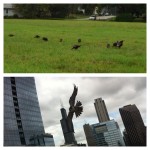Chicago’s Go-to Vet Reveals Seasonal Migration Brings Changes for Humans and Pets
Tips on Keeping Pets Safe from the Dangers of Seasonal Migration
 As fall approaches, many people will witness the amazing bird formations flying south for the winter. The seasonal migration of many animals happens naturally every year for breeding, gathering food and for their life cycles. However, many people are unaware of the effect seasonal migration has on humans and their pets.
As fall approaches, many people will witness the amazing bird formations flying south for the winter. The seasonal migration of many animals happens naturally every year for breeding, gathering food and for their life cycles. However, many people are unaware of the effect seasonal migration has on humans and their pets.
“Seasonal migration patterns affect pets in many ways,” says wildlife expert, Dr. Barbara Royal, DVM, CVA, founder and owner of The Royal Treatment Veterinary Center and author of “The Royal Treatment: A Natural Approach to Wildly Healthy Pets.”
“Weather changes, allergens in the air and new animals migrating through Chicago can affect our pets’ health in a number of ways,” warns Dr. Royal. “It is important for pet owners to be aware of the changing needs of pets and the challenges they face this time of year.”
According to Dr. Royal, pets are silent family members and owners can help keep them healthy and safe with these five tips:
- Watch for Changing Pet Allergies: Just like humans, changing seasonal winds, molds and pollens can affect allergies in our pets. Clean allergens off pets with shampoos that don’t dry the skin like Murphy’s Oil Soap. Pets can go through shedding cycles that affect their skin. Brushing and grooming can help keep them comfortable in their own skin. If you have an allergic pet, make sure its food isn’t adding to its allergy load – avoid corn, wheat, soy and peanut butter. As the air becomes dryer, dry skin may be a problem for your pet. Add small amounts of coconut oil or fish oil to the diet to help keep the skin healthy.
- Be Aware of Seasonal Health Risks: The season also brings new animals and new diseases to our area. Tick borne diseases have increased because animals that carry some of these diseases have moved further north. Wildlife reservoirs for diseases may shift as animals migrate as well. Although most animals that migrate tend to be very healthy, some may pose risks to pets. Animals may look ill but are simply tired from their migration, or they could actually be suffering from diseases – like West Nile Virus or even Rabies. While rodents and birds are very resistant to rabies, it can be found in skunks, raccoons or bats. Keep pets clear of wildlife to keep them safe. It is always best not to touch wildlife, and call authorities if you see a wild animal behaving oddly. Seasonal changes such as damp weather can increase the risk of fungal infections for animals that dig in the soil. Signs include persistent cough and lethargy or skin lesions that don’t heal.
- Understand Nutritional Needs: Be aware your pet’s nutritional needs and tastes may change from season to season. Putting on weight for winter is not uncommon, and animals tend to want to eat more as the winter approaches, even if they live indoors. They may crave different items or start eating something unusual. Even nutrient rich dirt may be more interesting to chew on in the fall after a summer of nutrients dropping into the soil.
- Keep Animals Safe Outdoors: Outdoor cats should be given one or two bells on their collars to keep them from killing migrating birds that might be tired when they land. Be careful if your dog or cat finds a bird or bat. Try to avoid contact. Many times these animals just need a rest and a little food so they can feel better and go on with their migration. If you have smaller pets, remember, migrating birds of prey or other carnivores moving through may be searching for an interesting meal. Watch your pets more carefully or stay outside with them when in the yard.
- Update Pet Medications and Travel Records: As the seasons change pet owners should talk to their vet about which pet medications they should stop or change. Is your pet on flea or tick medication? Do you treat your dog with monthly heartworm pills? As the weather gets colder in the Chicago area we don’t need to be so aggressive about some of these medications. Ask your vet what is best for you in your area. Don’t forget to update health certificates/records for traveling pets if owners are migrating from their summer home to their winter home.
